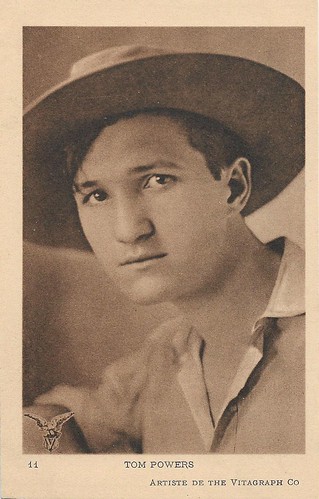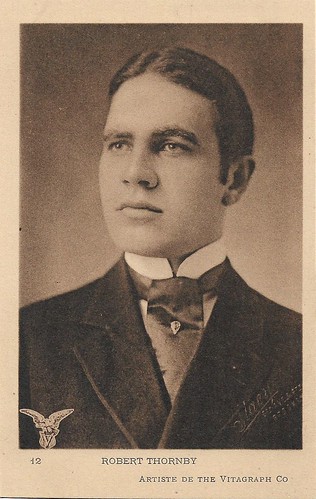On 5 January this year, EFSP did a post on the American Vitagraph Company, a pioneering film studio which was active during the silent era. The post included some French postcards which were probably published by the French subsidiary of The Vitagraph Co. In contrast to most American film companies, who had London as their hub for the European film distribution market, Vitagraph arranged its European distribution and publicity from Paris, including the astonishing film posters (de)signed by Harry Bedos. Ivo Blom recently acquired more cards of this series, which we share with you today.

Florence Turner. French postcard in the Artiste of the Vitagraph Co. series, no. 1. The series was probably issued by the Paris subsidiary of The Vitagraph Co. Photo: Stacy, Brooklyn.
Vitagraph made countless contributions to the history of film-making, and created the first American film star, Florence Turner ‘the Vitagraph Girl’. She had made her film debut in How to Cure a Cold (1907). At the time there were no stars per se, unless an already famous stage star made a film. Performers were not even mentioned by name. The Vitagraph Girl became the most popular American actress to appear on screen which was at that time still dominated by French pictures, especially from the Pathé and Gaumont companies. Her worth to the studio, as its biggest box-office draw, was recognised in 1907 when her pay was upped to $22 a week, as proto-star plus part-time seamstress.
Florence was paired several times with heartthrob Wallace Reid, who was also on his way to stardom. In March 1910, Turner and Florence Lawrence became the first American screen actors not already famous in another medium to be publicised by name by their studios to the general public. But with the rise of more stars, such as Mary Pickford at Biograph Studios, Florence Turner was no longer quite as special. By 1913 she was looking for new pastures and left the United States, accompanied by director Laurence Trimble. They moved to Great Britain, where she and Trimble began performing together in London music halls and started their own film company.

Leo Delaney. French postcard in the Artiste of the Vitagraph Co. series, no. 6. The series was probably issued by the Paris subsidiary of The Vitagraph Co. Photo: Stacy, Brooklyn.

Lillian Christy. French postcard in the Artiste of the Vitagraph Co. series, no. 7. The series was probably issued by the Paris subsidiary of The Vitagraph Co. Photo: Stacy, Brooklyn.

Mrs Mary Maurice. French postcard in the Artiste of the Vitagraph Co. series, no. 10. The series was probably issued by the Paris subsidiary of The Vitagraph Co. Photo: Stacy, Brooklyn.

Tom Powers. French postcard in the Artiste of the Vitagraph Co. series, no. 11. The series was probably issued by the Paris subsidiary of The Vitagraph Co.

Robert Thornby. French postcard in the Artiste of the Vitagraph Co. series, no. 12. The series was probably issued by the Paris subsidiary of The Vitagraph Co.

William R. Dunn. French postcard in the Artiste of the Vitagraph Co. series, no. 17. The series was probably issued by the Paris subsidiary of The Vitagraph Co.

Zena Keife. French postcard in the Artiste of the Vitagraph Co. series, no. 18. The series was probably issued by the Paris subsidiary of The Vitagraph Co.

Tefft Johnson. French postcard in the Artiste of the Vitagraph Co. series, no. 19. The series was probably issued by the Paris subsidiary of The Vitagraph Co. Photo: Stacy, Brooklyn.

Rosemary Theby. French postcard in the Artiste of the Vitagraph Co. series, no. 20. The series was probably issued by the Paris subsidiary of The Vitagraph Co. Photo: Stacy, Brooklyn.

Florence Turner. French postcard in the Artiste of the Vitagraph Co. series, no. 1. The series was probably issued by the Paris subsidiary of The Vitagraph Co. Photo: Stacy, Brooklyn.
Vitagraph made countless contributions to the history of film-making, and created the first American film star, Florence Turner ‘the Vitagraph Girl’. She had made her film debut in How to Cure a Cold (1907). At the time there were no stars per se, unless an already famous stage star made a film. Performers were not even mentioned by name. The Vitagraph Girl became the most popular American actress to appear on screen which was at that time still dominated by French pictures, especially from the Pathé and Gaumont companies. Her worth to the studio, as its biggest box-office draw, was recognised in 1907 when her pay was upped to $22 a week, as proto-star plus part-time seamstress.
Florence was paired several times with heartthrob Wallace Reid, who was also on his way to stardom. In March 1910, Turner and Florence Lawrence became the first American screen actors not already famous in another medium to be publicised by name by their studios to the general public. But with the rise of more stars, such as Mary Pickford at Biograph Studios, Florence Turner was no longer quite as special. By 1913 she was looking for new pastures and left the United States, accompanied by director Laurence Trimble. They moved to Great Britain, where she and Trimble began performing together in London music halls and started their own film company.

Leo Delaney. French postcard in the Artiste of the Vitagraph Co. series, no. 6. The series was probably issued by the Paris subsidiary of The Vitagraph Co. Photo: Stacy, Brooklyn.

Lillian Christy. French postcard in the Artiste of the Vitagraph Co. series, no. 7. The series was probably issued by the Paris subsidiary of The Vitagraph Co. Photo: Stacy, Brooklyn.

Mrs Mary Maurice. French postcard in the Artiste of the Vitagraph Co. series, no. 10. The series was probably issued by the Paris subsidiary of The Vitagraph Co. Photo: Stacy, Brooklyn.

Tom Powers. French postcard in the Artiste of the Vitagraph Co. series, no. 11. The series was probably issued by the Paris subsidiary of The Vitagraph Co.

Robert Thornby. French postcard in the Artiste of the Vitagraph Co. series, no. 12. The series was probably issued by the Paris subsidiary of The Vitagraph Co.

William R. Dunn. French postcard in the Artiste of the Vitagraph Co. series, no. 17. The series was probably issued by the Paris subsidiary of The Vitagraph Co.

Zena Keife. French postcard in the Artiste of the Vitagraph Co. series, no. 18. The series was probably issued by the Paris subsidiary of The Vitagraph Co.

Tefft Johnson. French postcard in the Artiste of the Vitagraph Co. series, no. 19. The series was probably issued by the Paris subsidiary of The Vitagraph Co. Photo: Stacy, Brooklyn.

Rosemary Theby. French postcard in the Artiste of the Vitagraph Co. series, no. 20. The series was probably issued by the Paris subsidiary of The Vitagraph Co. Photo: Stacy, Brooklyn.
No comments:
Post a Comment